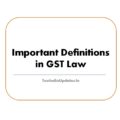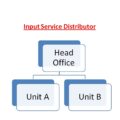Records, Invoices and Debit & Credit Note in GST Law
The records/details and returns are important part of compliance of any tax law. In Indirect Taxation these records/information are play very vital role because the proper records helps both revenue and assessee to ascertain tax liability. The provisions of records and returns in Model GST law are brought from existing law relating to VAT/Service Tax/Central Excise law.The upcoming GST Law will be a signal tax instead of various state and central level indirect taxes.
Section 23 , 23A and 24 of Model GST Law is deal with invoice, credit/debit note and tax to be indicated in tax invoice and other documents. These sections are summarised below:
- A registered taxable person supplying taxable goods, shall issue, at the time of supply, a tax invoice showing the description, quantity and value of goods, the tax charged thereon and such other particulars as may be prescribed.
- A registered taxable person, supplying services, shall issue a tax invoice within the prescribed time; showing the description, the tax charged thereon and other such particulars as may be prescribed.
- A registered taxable person supplying non-taxable goods and/or services or paying tax under composition levy shall issue, instead of a tax invoice, a bill of supply containing such particulars as may be prescribed.
- Debit Note: Where a tax invoice has been issued for supply of any goods and/or services and the taxable value and/or tax charged in that tax invoice is found to be less than the taxable value and/or tax payable in respect of such supply, the taxable person, who has supplied such goods and/or services, shall issue to the recipient a debit note containing such particulars as may be prescribed on or before the thirtieth day of September following the end of the financial year in which such supply was made, or the date of filing of the relevant annual return, whichever is earlier.
- Credit Note: Where a tax invoice has been issued for supply of any goods and/or services and the taxable value and/or tax charged in that tax invoice is found to exceed the taxable value and/or tax payable in respect of such supply, the taxable person, who has supplied such goods and/or services, may issue to the recipient a credit note containing such particulars as may be prescribed on or before the thirtieth day of September following the end of the financial year in which such supply was made, or the date of filing of the relevant annual return, whichever is earlier:
Tax Invoice
Section 31 of CGST Act, 2017 deals with Tax Invoice, Credit and Debit Notes under GST law. The summarised provisions are as under:
Tax Invoice for Goods
A registered person supplying taxable goods shall, before or at the time of, removal of goods for supply to the recipient, or delivery of goods or making available thereof to the recipient, issue a tax invoice showing the description, quantity and value of goods, the tax charged thereon.
Tax Invoice in case of Continuous Supply of Goods:
In case of continuous supply of goods, where successive statements of accounts or successive payments are involved, the invoice shall be issued before or at the time each such statement is issued or, as the case may be, each such payment is received.
The term “Continuous Supply of Goods” is defined in Section 2 (32) is define as a supply of goods which is provided, or agreed to be provided, continuously or on recurrent basis, under a contract, whether or not by means of a wire, cable, pipeline or other conduit, and for which the supplier invoices the recipient on a regular or periodic basis and includes supply of such goods as the Government may, subject to such conditions, as it may, by notification, specify.
Tax Invoice for Services
A registered person supplying taxable services shall, before or after the provision of service but within 30 days from supply of services (Rule 47 of CGST Rules, 2017), issue a tax invoice, showing the description, value, tax charged thereon.
Tax Invoice in case of Continuous Supply of Services:
In case of continuous supply of services, the invoice will be issued as under:
(a) where the due date of payment is ascertainable from the contract, the invoice shall be issued on or before the due date of payment;
(b) where the due date of payment is not ascertainable from the contract, the invoice shall be issued before or at the time when the supplier of service receives the payment;
(c) where the payment is linked to the completion of an event, the invoice shall be issued on or before the date of completion of that event.
The term “Continuous Supply of Services” is defined in Section 2 (33) as a supply of services which is provided, or agreed to be provided, continuously or on recurrent basis, under a contract, for a period exceeding three months with periodic payment obligations and includes supply of such services as the Government may, subject to such conditions, as it may, by notification, specify.
Bill of Supply
A registered person supplying exempted goods or services or both or paying tax under the provisions of section 10 shall issue, instead of a tax invoice, a bill of supply. [Rule 46A of CGST Rules, 2017]
Contents of Bill of Supply: A ‘Bill of Supply’ issued by the supplier shall contain the following details, namely, –
(a) name, address and Goods and Services Tax Identification Number of the supplier;
(b) a consecutive serial number not exceeding sixteen characters, in one or multiple series, containing alphabets or numerals or special characters – hyphen or dash and slash symbolised as “-” and “/” respectively, and any combination thereof, unique for a financial year;
(c) date of its issue;
(d) name, address and Goods and Services Tax Identification Number or Unique Identity Number, if registered, of the recipient;
(e) Harmonised System of Nomenclature Code for goods or services;
(f) description of goods or services or both;
(g) value of supply of goods or services or both taking into account discount or abatement, if any; and
(h) signature or digital signature of the supplier or his authorised representative :
Minimum Monetary limit to issue Tax Invoice:
The registered person may not issue a Tax Invoice or Bill of supply if the value of the goods or services or both supplied is less than Rs.200/-.
Debit Note: Section 34 (3) of CGST Act, 2017
Where a tax invoices have been issued for supply of any goods or services or both and the taxable value or tax charged in that tax invoice is found to be less than the taxable value or tax payable in respect of such supply, the registered person, who has supplied such goods or services or both, shall issue to the recipient a Debit Note for supplies made in a financial year.
Any registered person who issues a debit note in relation to a supply of goods or services or both shall declare the details of such debit note in the return for the month during which such debit note has been issued and the tax liability shall be adjusted in such manner as may be prescribed.
Credit Note: 34 (1) of CGST Act, 2017
Where a tax invoices have been issued for supply of any goods or services or both and the taxable value or tax charged in that tax invoice is found to exceed the taxable value or tax payable in respect of such supply, or where the goods supplied are returned by the recipient, or where goods or services or both supplied are found to be deficient, the registered person, who has supplied such goods or services or both, may issue to the recipient a Credit Note for supplies made in a financial year containing such particulars as may be prescribed.
Any registered person who issues a Credit Note in relation to a supply of goods or services or both shall declare the details of such credit note in the return for the month during which such credit note has been issued but not later than September following the end of the financial year in which such supply was made, or the date of furnishing of the relevant annual return, whichever is earlier, and the tax liability shall be adjusted in such manner as may be prescribed.
No reduction in output tax liability of the supplier shall be permitted, if the incidence of tax and interest on such supply has been passed on to any other person.
HSN Code for GST Invoices
Notification No. 78/2020 – Central Tax dated 15-10-2020 provided HSN code as under:
| Annual aggregate turnover for the previous financial year | HSN Code required | Remarks |
| Up to Rs.5 Crore | 4 digit HSN Code required | In case sale is to unregistered person, HSN code is not required. |
| More than Rs.5 Crore | 6 digit HSN Code required | HNS Code is mandatory even sale to unregistered person. |
E-Invoices under GST Law
The CBIC notified via Notification No. 5/2021 dated 08-03-2021 that e-invoicing will be applicable from 1st April 2021 for businesses with a turnover of more than Rs.50 crore. Also, the aggregate turnover will include the turnover of all GSTINs under a single PAN across India. However, irrespective of the turnover, e-Invoicing shall not be applicable to the following categories of registered persons for now, as notified in CBIC Notification No.13/2020 – Central Tax:
- An insurer or a banking company or a financial institution, including an NBFC
- A Goods Transport Agency (GTA)
- A registered person supplying passenger transportation services
- A registered person supplying services by way of admission to the exhibition of cinematographic films in multiplex services
- An SEZ unit (excluded via CBIC Notification No. 61/2020 – Central Tax)
- A government department and Local authority (excluded via CBIC Notification No. 23/2021 – Central Tax)
Persons mandatorily require issuing e-invoices –
Registered person, other than a Special Economic Zone unit and those referred to in sub-rules (2), (3), (4) and (4A) of rule 54 of the said rules, whose aggregate turnover in any preceding financial year from 2017-18 onwards exceeds one hundred crore rupees, as a class of registered person who shall prepare invoice and other prescribed documents, in terms of rule 48(4) in respect of supply of goods or service or both to a registered person Notification No. 13/2020 – CT dated 21.3.2020 amended w.e.f. 01.01.2021 [earlier, the limit was its 500 grams).
[Note – Rule 54(2) – Insurer, Banking company, FI, NBFC, Rule 54(3) – GTA, Rule 54(4) Passenger Transport Service, Rule 54(4A). Admission to films in multiplex screens). The invoice is not required for B2C transaction. However, OR Code is required.
IRP – Electronic portals for e-invoice – IRP (Invoice Registration Portal) is the website for uploading/reporting of invoices. Ten portals starting from www.einvoice1.gst.gov.in to www.invoice10.gst.gov.in have been notified for preparation of e-invoice. These websites are managed by GSTN – Notification No. 69/2019-CT dated 13-12-2019.
Where e-invoice required – e-invoice is required for
(a) tax invoice [B2B, B2B on RCM.
(b) Revised tax invoice, Credit Note and Debit note.
(c) Consolidated tax invoke by insurer, banking company or Financial Institution.
(d) Export Invoice.
No e-invoice for B2C transaction – E-invoice is not required for supplies by registered person to unregistered person.
Where e-invoice is not required – E -invoice is not required for self-invoice on RCM. consolidated tax invoice in B2C supplies. It is also not required for following – Rule 54(2)- Insurer, Banking company, FI, NBFC, Rule 54(3) – GTA, Rule 54(4) – Passenger T: :import Service, Rule 54(4A) – Admission to films in multiplex screens.
E-invoice will be auto-populated in GSTR-1 of supplier e-Invoice will be auto-populated in GSTR-1 of supplier upon successful generation of IRN (Invoice Reference Number). Details can be downloaded as excel file.
Electronic portals for e-invoice – Total 10 portals starting from www.einvoice1.gst.gov.in to www.einvoice10.gst.gov.in have been notified for preparation of e-invoice. These websites are managed by GSTN – Notification No. 69/2019-CT dated 13-12-2019.
Edition of invoices uploaded – The details of e-invoice uploaded in GSTR-1 can be edited/deleted by taxpayer. However, in such cases, ‘Source’ ‘IRIS’ and ‘IRN date’ fields will be rest to blank. These invoices will not get reflected in GSTR-2A/2B/4A 6A also. Such edited documents will be treated as uploaded separately by taxpayer -Instructions on gst.gov.in website dated 11-1-2021.
Downloading of invoices uploaded – Consolidated download facility of all documents populated from c-invoice is available in GSTR-1 dashboard. The du reload will be in excel form.
‘e-Invoicing’ or ‘electronic invoicing’ is a system in which B2B invoices are authenticated electronically by GSTN for further use on the common GST portal. Under the electronic invoicing system, an identification number will be issued against every invoice by the Invoice Registration Portal (IRP), managed by the GST Network (GSTN). The National Informatics Centre launched the first IRP at einvoice1.gst.gov.in. All invoice information will be transferred from this portal to both the GST portal and e-way bill portal in real-time. Therefore, it will eliminate the need for manual data entry while filing GSTR-1 returns and generation of part-A of the e-way bills, as the information is passed directly by the IRP to the GST portal.





